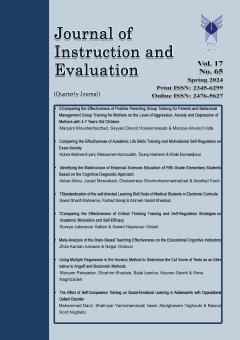Comparing the effectiveness of critical thinking training and self-regulation strategies on academic motivation and self-efficacy.
Subject Areas : Educational Psychologysoraiya jabarpour sattari 1 * , saeed najarpour ostadi 2
1 - No
2 - .....
Keywords: Critical thinking training, Self-regulation strategies, Academic motivation, Self-efficacy,
Abstract :
Comparing the effectiveness of critical thinking training and self-regulation strategies on academic motivation and self-efficacy The purpose of this research was to compare the effectiveness of critical thinking training and self-regulation strategies on academic motivation and self-efficacy of female students in the second year of high school in Tabriz. This research was a semi-experimental type and was conducted in the form of pre-test-post-test-follow-up with a control group. All the subjects were evaluated using Waller and Blaise's educational motivation scale and Scherer's self-efficacy questionnaire. The sampling method was purposeful; In this way, among the students whose grades in the questionnaires were one standard deviation lower than the average, 30 people were randomly replaced in the experimental groups and 15 people in the control group. The first experimental group received ten ninety-minute sessions of critical thinking training. The second experimental group received eight 90-minute sessions of self-regulation strategies, but the control group did not receive any training. The results of repeated measurement variance analysis indicated that providing critical thinking training and self-regulation learning strategies has significantly increased academic motivation and self-efficacy in students. Also, there was no significant difference between the scores of academic motivation and self-efficacy in the two groups of critical thinking training and self-regulation strategies. The results of this research showed that teaching critical thinking and self-regulation strategies can be used as an efficient method to increase students' academic motivation and self-efficacy.

